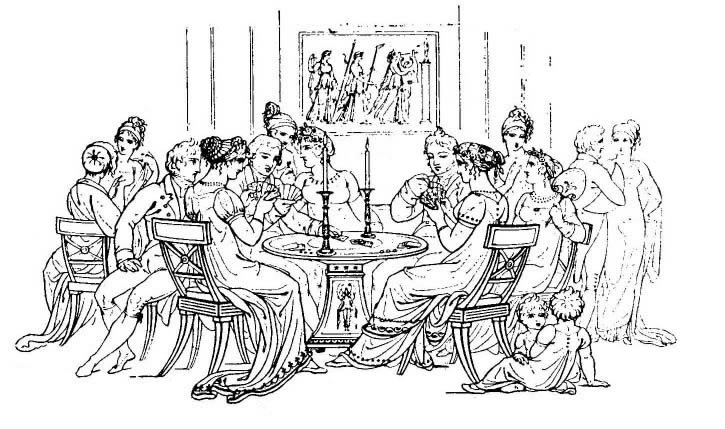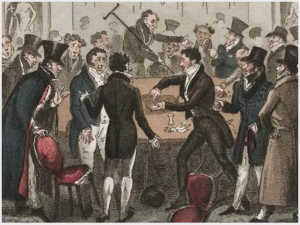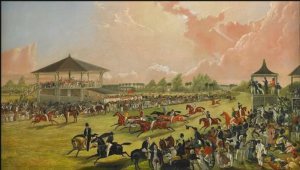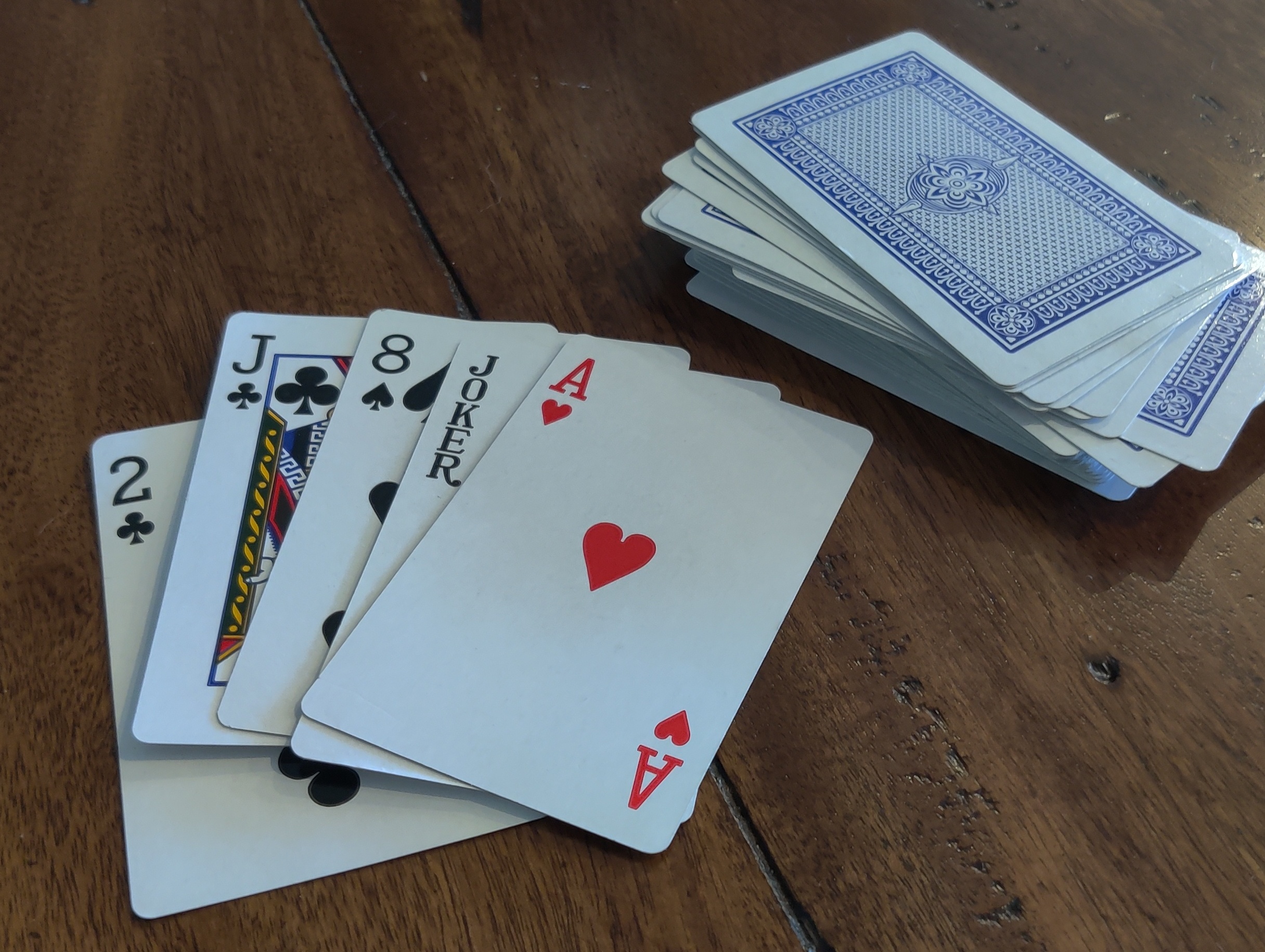
Gamble like the Gentlefolk
During the Regency and Georgian Eras, gambling was a not only a socially acceptable pastime among the upper classes, it was wildly popular. Gentlemen and ladies alike enjoyed games of chance, although ladies mostly played in private homes rather than clubs. Many period novels, including Jane Austen’s, refer to characters playing and betting on card games almost as frequently as they danced, went for walks, and rode horses.
Private House Games
Popular games among guests and friends in homes included Whist, Cribbage, Lottery (a card game), Brag, and Piquet. According to “The Hand-Book of Games,” three-card Brag was the third most-played card game in Great Britain. Piquet, a two-player game, was one of the trickier games to play, so it was mostly played by the semi-pro players.
Private gatherings didn’t have a dealer and were generally lower-stakes games. Players kept score on paper rather than playing with money or chips. However, at serious game parties hosted by an enthusiast, people played more serious games such as Faro, Quadrille (the game–not the dance), and Loo (with limits) which required chips or counters. These counters came in a variety of colors such as green, red, black, and ivory.
In Pride & Prejudice, Elizabeth declines a game during a party because the players appear to be playing deeper than she feels she can afford. Even the great snob, Lady Catherine de Bourgh was fond of playing Quadrille. I found many period drawings of ladies playing games with counters. Those who frequently played games sometimes carried custom-made game counters called “fish.” Some of these chips even looked like small carved fish and are quite detailed and lovely. They were made of ivory, mother-of-pearl, and rare woods. Many counters were specific for each game. Surviving counters have inscriptions such as “Whist.”
During these eras, some game enthusiasts carried specially-made gaming boxes that were velvet lined or gaming purses to carry their counters. Gaming purses had small drawstring bags with a flat, circular base with sides gathered on a drawstring to prevent spilling or revealing the contents. Some extant gaming purses have a coat of arms stitched on the bottom to identify the owner. These gaming bags were carried by both men and women to keep their fish handy when playing serious games.
Don’t Dance? Gamble!
Pretty much every ball had a cardroom for games, and most public assemblies did, too. These games generally remained friendly and players played for low stakes. I think they were mostly a place for the older set, and for those who didn’t care to dance or socialize. Such rooms might also have been a welcome relief from the noise and crowds on the ballrooms. But still, it does help illustrate how wide-spread games of chance and wagering was, doesn’t it?
The most serious gamblers went to their gentlemen’s clubs such as White’s, Brooks’s, Boodles, etc. or even to clubs that specialized games such as The Cocoa Tree and the notorious Crockford’s.
No respectable gentlemen’s clubs allowed ladies to enter their hallowed halls. Ladies had to be content to play in homes or assemblies, or if they were really daring and didn’t mind a bit of scandal, venture to clubs that catered to less genteel clientele than gentlemen-only clubs.
At clubs, gentleman played high-stakes games such as Faro (like roulette but with cards), Hazard (a game using dice or “bones”), Vingt-et-un (21), Commerce, and unlimited Loo, among others. One popular game that really caught my interest is Macao. It’s a card game similar to Crazy 8’s but uses a standard 52 card deck and involves a lot of bluffing. Cheating is apparently encouraged! I don’t know if casual game-players played this game at home in low-stakes games, or if it were generally only played at clubs for high stakes. I assume there was some cross over between these different types of games.
Gaming Hells
A term I frequently encounter is “Gaming Hell.” Some sources and authors use that term interchangeably with Gaming Clubs. According to some sources, higher-class clubs were called “Golden Hells,” and the lower class places were called “Copper Hells.” Yet, some use “Gaming Hell” to describe a lower-class establishment that catered to mostly lower classes with games that relied more on chance than on skill, such as dice games.
Regency gambling didn’t end at the tables. Formal horse racing occurred at courses such as Newmarket, Ascot, Doncaster, Epsom, Warwick, etc.
Informal steeple chasing as well as racing on private courses took place in the country. Both forms of horse racing had wagers of all sizes placed on winners and losers.
Regency era people also bet on cock fights, bear baiting, and fisticuffs (boxing).
Bets
In addition, gentleman and ladies bet on everyday events ranging from when someone would marry to how many birds would perch on a nearby fence. White’s, a famous club where gentlemen gather to discuss politics, have meetings, play games, dine, and simply socialize had a famous book where gentlemen recorded their bets. Anything written in that book was as binding as a gentleman’s IOU, known as “vowels.”
Gentleman’s Debts
Gentlemen won and lost fortunes in games of chance. Many men went bankrupt, losing their homes and properties. Though most everyone in the Regency loved to wager or gamble, they also frowned upon those who did it excessively and censured those who lost great fortunes, property, and to a degree, status.
Gentlemen’s debts were always expected to be paid. A man who failed to pay his vowels suffered great loss to his honor and suffered social rejection. Sadly, owing great debts to merchants didn’t have the same stigma as owing great debts to another gentleman as a result of a wager.
The Church and Gambling
During this era, some protestant sects opposed the pastime of gambling and really any form of card or dice games. However, the Roman Catholic Church did not, nor, apparently did the Church of England. Men of the cloth of these religions were every bit as likely to play games and gamble as anyone else. High-ranking Church of England clergymen had custom-made bags for chips with their family coat of arms embroidered on the bottom, some of which survive today.
I love card games, and after doing all this research, I’ve decided I want to try some of these–especially Piquet and Macao (without wagering real money, of course)!
Have any of these games piqued your interest?
Sources
What Jane Austen Ate and Charles Dickens Knew by Daniel Pool, Simon & Schuster, 1993
Everyday Life in Regency and Victorian England, From 1811-1902, by Kristine Hughes, 1998
The Hand-Book of Games, by H.G. Bohn, published in London, 1867
Gaming-counters by Sharon Lathan has pictures of different types including images of “fish”
Jane Austen’s World has a list of further links at the end
https://judeknightauthor.com/tag/card-games-in-the-regency/
https://englishhistoryauthors.blogspot.com/2012/09/a-profitable-vice-gambling-in-regency.html
https://sites.google.com/site/whshbljaneausten/card-games-in-pride-and-prejudice
https://www.cherylbolen.com/gambling.htm
https://allaboutromance.com/gambling-in-historic-england/
Regency Gaming Hells
Gambiter: http://gambiter.com/cards/Macau_card_game.html
Historical Hussies: Gaming ClubsI coud(




Hello, Donna! Thank you for your interesting article! I just have one question..in some of the gambling clubs/hells, would the middle/upper middle class and the upper class ever mix together in the same club? Or would they usually remain separate?
Hi Aly. Thanks for visiting my blog. I hope you enjoyed it. To answer your question, it depends on the club. The big ones such as Whites, Brooks’s etc. were members-only and one had to have a sponsor and be recommended by a member and then approved by the majority of the members, so they were pretty exclusive to the aristocracy–or at least gentry. Many were open mostly those those of a certain political party but I have heard of members of parliament belonging to more than one club. I have more information about gentleme’s clubs in this blog post: https://donnahatch.com/english-gentlemens-clubs/. Other clubs may have been more open as to who could be members. The basic gambling “hells” were open to the public, so anyone who went there would expect to have to rub shoulders, so to speak, with everyone there. As to how much the different classes actually interracted as opposed to having tables with their own peers is anyone’s guess. Does that help?